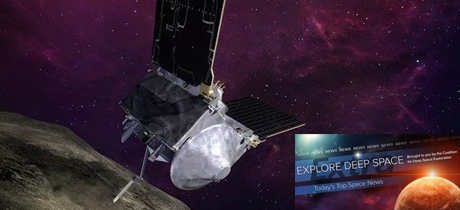In Today’s Deep Space Extra… Samples of asteroid Bennu collected by NASA’s OSIRIS-REx spacecraft have been successfully sealed in the probe’s Sample Return Capsule in preparation for a 2023 return to Earth. Observations of the Milky Way suggest planets without stars to call home may be common.
Human Space Exploration
Automating robotics: CSA preparing for future with Canadarm2/Dextre
NASAspaceflight.com (10/29): The Canadian Space Agency’s (CSA) primary contribution to the International Space Station (ISS) is the Canadarm2 robotic arm, which supports arriving cargo logistics and spacewalks. In keeping with the International Space Station’s goal of serving as a testbed for technologies that will be critical for future human deep space exploration, the robotic arm is also being the subject of efforts to test autonomous operations suited for devices such as the Canadarm3 for the NASA-led Gateway.
Detected crack aboard Space Station may be a result of external impact, says cosmonaut
TASS of Russia (10/29): The small air leak in the Russian segment of the International Space Station (ISS) may have been created by an impact on the exterior, according to the station’s current commander, cosmonaut Sergei Ryzhikov. The air leak was tracked down earlier this month and sealed. Efforts to examine the impact site outside should be included in a spacewalk planned for November 18, Ryzhikov advised Russia’s mission control. (Editor’s Note: TASS is an official news outlet of the Russian government.)
Space Science
NASA’s OSIRIS-REx probe successfully stores small sample of asteroid rocks in its belly
The Verge (10/29): NASA’s OSIRIS-REx mission and science teams reported Thursday they have successfully enclosed samples gathered from asteroid Bennu on October 20. Collected in a container within the tip of the probe’s Touch-and-Go Sample Acquisition Mechanism (TAGSAM), the materials have been secured in the spacecraft’s Sample Return Capsule, which will descend to Earth in 2023. The transfer to the return capsule was expedited when the team discovered some of the asteroid material was escaping from the TAGSAM container.
JAXA preparing to retrieve Hayabusa2 capsule
NHK of Japan (10/29): The Japanese space agency is making preparations to send a team to Australia to recover an asteroid sample return capsule scheduled to be dropped off by the Hayabusa 2 spacecraft on December 6. Launched in late 2014, the spacecraft traveled to asteroid Ryugu to gather samples of surface and subsurface materials and landed twice during 2019. NASA and the Japan Aerospace Exploration Agency (JAXA) plan to exchange materials from their respective OSIRIS-REx and Hayabusa 2 missions.
Tiny rogue planet is the smallest free-floating exoplanet candidate yet
Space.com (10/29): Researchers have identified the smallest rogue planet yet, one moving through the Milky Way that is not linked to a single star. A study published in Astrophysical Journal Letters speculates there could be many more rogue planets.
Opinion
The case for NASA’S Bridenstine post-Election Day
The Hill (10/29): No matter the outcome of the November 3 presidential election, NASA Administrator Jim Bridenstine should stay on because of dynamic activities now underway, according to an op-ed from David Lindgren, a Washington D.C. based space policy researcher. As examples, he cites NASA’s work in leading an international effort to return humans to the surface of the Moon, as well as the NASA Administrator’s work in determining a private sector-managed course for future human activity in low Earth orbit as the International Space Station (ISS) marks its 20th year of astronauts living and working aboard.
Other News
House Space Force Caucus co-chair voices concern about orbital debris, supports Commerce assuming debris-tracking role
SpaceNews.com (10/29): U.S. Rep. Doug Lamborn (R-Colo.), a co-chair of the House Space Force Caucus expressed concern this week that space debris might be a major threat to a booming space economy. Lamborn said that though the government is working to enhance space situational awareness, U.S. regulations could improve. He said questions also remain about international cooperation regarding safety in outer space.

